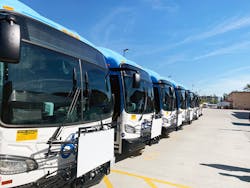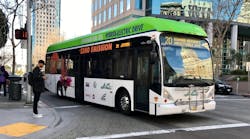OCTA debuts hydrogen fuel cell buses and nation’s largest hydrogen fueling station
The Orange County Transportation Authority (OCTA) debuted 10 new hydrogen fuel cell electric buses and, what it reports to be, the largest transit-operated hydrogen fueling station in the United States. Both are part of OCTA’s continued sustainability efforts.
“We are very happy to be leading the way toward a cleaner and greener future that keeps the residents of Orange County moving, while keeping the air they breathe healthy with zero emissions,” said OCTA Chairman and Mayor of Garden Grove Steve Jones.
In December 2018, the California Air Resources Board’s (CARB) approved a regulation that requires the state’s transit agencies to transition 100 percent of their fleets to zero emission by 2040.
OCTA is also in the process of purchasing 10 plug-in battery-electric buses, which are expected to be in operation beginning in 2021.
“We are proud to be working with all of our partners to set a strong example as a large urban transit operator making a positive impact on the environment,” said OCTA CEO Darrell E. Johnson. “We will continue to explore the use of zero-emission technology to ensure we deliver a balanced and sustainable transportation system for Orange County’s future.”
OCTA’s hydrogen fueling station is located at the authority’s Santa Ana Bus Base and can support up to 50 fuel cell buses per day. The Center for Transportation and the Environment (CTE) was responsible for managing all aspects of the project, including the design and production of 10 buses, building the new high-capacity station and upgrading the facilities at OCTA’s Santa Ana Bus Base to work safely on hydrogen-fueled vehicles.
“This is one of the leading fuel cell electric bus deployments in North America and demonstrates the value of fuel cells in helping California meet its greenhouse gas emission reduction goals in the transportation sector,” stated Dan Raudebaugh, CTE’s executive director.
The 10 Xcelsior CHARGE H2™ hydrogen fuel cell buses were supplied by New Flyer of America, Inc. The new buses, which have a range of 300 miles, will be strategically integrated into OCTA’s bus fleet to operate in communities that serve disadvantaged populations.
“Since 1990, New Flyer has proudly delivered over 1,000 buses to OCTA and today is thrilled to support its continued evolution to zero-emission; reducing California’s carbon footprint and providing cleaner, healthier, quieter neighborhoods,” said Chris Stoddart, president, New Flyer. “As OCTA works toward its 2021 vision focused on sustainability, reliability and innovative leadership in transit, New Flyer will continue to provide mobility solutions that protect the surrounding environment and build livable communities across Orange County.”
OCTA says the project was also delivered with Air Products, Trillium, Ballard and Fiedler Group. Air Products designed and provided enabling equipment for the hydrogen fueling station and will provide maintenance and hydrogen fuel. Trillium was contracted for construction, operations and maintenance of the fueling station. Ballard worked on the hydrogen fuel cell electric technology on the buses. Fiedler Group engineered upgrades to maintenance facilities to safely service hydrogen-fueled buses.
Funding for the project comes from California Climate Investments, which is a statewide initiative that puts billions of cap-and-trade dollars to work reducing greenhouse gas emissions, strengthening the economy and improving public health and the environment and from SB1 State of Good Repair funds, administered by Caltrans, and from the South Coast AQMD Clean Fuels Fund.
CARB awarded a $22.3-million grant to launch the project, which represents the largest single grant to date it has awarded to a transit agency.
“California’s transit agencies are leading the revolution to zero-emission transportation by taking action to replace their fossil-fuel powered buses with the very cleanest models available,” said CARB Chair Mary D. Nichols. “The Orange County Transportation Authority is among the state’s and the nation’s leaders in this crucial effort. This project will accelerate the commercialization of hydrogen fuel cell powered buses. It also showcases today’s hydrogen fueling facility to keep those zero-emission buses powered up and clearing the air.”
OCTA was the first large public transportation agency in southern California to operate a hydrogen fuel cell electric bus, debuting a pilot program in 2016.

Mischa Wanek-Libman | Group Editorial Director
Mischa Wanek-Libman is director of communications with Transdev North America. She has more than 20 years of experience working in the transportation industry covering construction projects, engineering challenges, transit and rail operations and best practices.
Wanek-Libman has held top editorial positions at freight rail and public transportation business-to-business publications including as editor-in-chief and editorial director of Mass Transit from 2018-2024. She has been recognized for editorial excellence through her individual work, as well as for collaborative content.
She is an active member of the American Public Transportation Association's Marketing and Communications Committee and served 14 years as a Board Observer on the National Railroad Construction and Maintenance Association (NRC) Board of Directors.
She is a graduate of Drake University in Des Moines, Iowa, where she earned a Bachelor of Arts degree in Journalism and Mass Communication.






